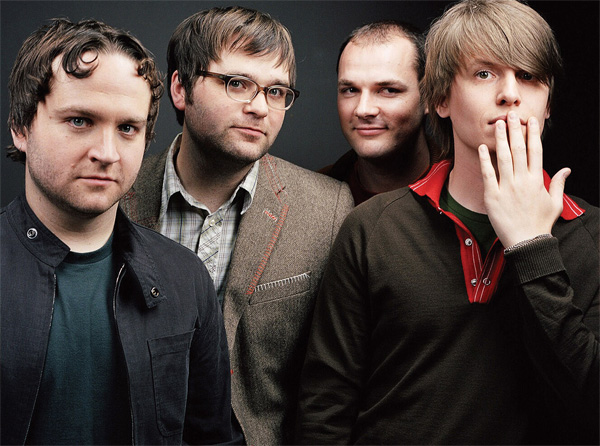http://m.youtube.com/watch?v=_CydL91xZak&desktop_uri=%2Fwatch%3Fv%3D_CydL91xZak
“Crooked Teeth” by Death Cab for Cutie conveys responsibility and forlornness; tenets of existentialism. The tone of the music and the tone of the lyrics are contrasting. The music displays emotional depth, unlike in The Stranger, where the simplicity and monotone speech demonstrates a lack of emotion. The lead singer of Death Cab for Cutie, Ben Gibbard, recently lost a lot of weight. He took his life into his own hands, created and defined his own life. He is also a singer, songwriter and guitarist. Through his band, he searches for something to fill the empty void of his forlornness. His existentialism leaks into the songs he writes, which in the song “Crooked Teeth”, is displayed through many of the lyrical verses.
The theme responsibility is illustrated in “Crooked Teeth” by Death Cab for Cutie. Responsibility is creating meaning for your own life. No one can define it for you or create it for you. In this song, the lyrics demonstrate this tenet. “Cause I built you a home in my heart, With rotten wood it decayed from the start.” Here the artist writes about how he took responsibility and began to create his own life. Although creating something from something that is already rotten will only decay after time. Something that starts broken can never be fixed.
Similarly, in The Stranger by Albert Camus, Meursault begins to create his own life, but he also begins to build his life on things that are broken. On page 41, Meursault says, “When I was a student, I had lots of ambitions like that. But when I had to give up my studies I learned very quickly that none of it really mattered.” Meursault constructed his life without the values that had once been important to him. This quote leads you to believe that when Meursault was younger, he had ambitions and cared about things, but he gave up on them and built his life with his own values outside the absolute systems.
Forlornness is conveyed in the lyrics of “Crooked Teeth.” Forlornness is the feeling of despair, isolation, hopelessness after realizing that one must create their own meaning. Being in a state of forlornness can happen whenever a part of your life is based upon something that can break down, like a relationship or an athlete that gets injured. In “Crooked Teeth”, the artist sings lyrics that say “Cause you can’t find nothing at all if there was nothing there all along. No you can’t find nothing at all if there was nothing here all along.” The artist describes here the loneliness and hopelessness he feels. He has lost a loved one, but realizes that there was actually no love. He has been alone and is alone again now. As said in the lyrics, you can’t create something if there was nothing there in the beginning. No one can experience what you do or know how you truly feel. This is attributed to the sense of anxiety one feels.
In The Stranger by Albert Camus, Meursault also experiences forlornness. He has a lack of caring and is lonely because he has no one. Even after he finds someone, he doesn’t even know if he loves her. On page 41, “That evening, Marie came by to see me and asked me if I wanted to marry her. I said it didn’t make any difference to me and that we could if she wanted to. Then she wanted to know that I loved her. I answered the same way I had that last time, that it didn’t mean anything, but that I probably didn’t love her.” Meursault is unable to feel emotion or actually love for somebody. He has realized that it is his own job to create his own world and identity. Because he has realized this, he is unable to feel love for Marie.
The emotional depth displayed throughout the lyrics of the song does not coercively match the tone of the music. Through the song, the music is happy and upbeat, misleading you to believe that without the lyrics, the song would be about positive and blissful subjects. The lyrics reflect the artists struggling emotional life, while the music and sound don’t reflect anything. The music is just a happy sound the band created to trick one into believing that the song is not sad, but is happy. The lyrics in “Crooked Teeth” are very unlike the monotone writing in The Stranger.
The text in The Stranger is the opposite of the lyrics in Crooked Teeth. In The Stranger, the text is very simple and monotone, making it impossible for the reader to create emotional depth while reading. This is the style of Camus’s writing and it is written in this way, for a specific reason. All the sentences are short and simple, while the opposing script, in Crooked Teeth, the lyrics talk a lot about the inability to feel emotion and the artist describes specific scenes and explains in detail.
“Crooked Teeth” by Death Cab for Cutie and The Stranger by Albert Camus both illustrated many tenets of existentialism. Specifically chosen were the characteristics of responsibility and forlornness. Contrastingly, the actually text in each of the pieces are different. In the song, the lyrics are emotional, yet still displaying existentialism, while in The Stranger; the text is very simplistic and monotone. Both of these pieces successfully display similar tenets of existentialism in comparable ways, as well different ways. Although the band Death Cab for Cutie and Albert Camus are from completely different time periods, and create different styles of literature, music and novels, both pieces compared here have still been able to relate to each other because both have the foundation of responsibility, forlornness and a perpendicular style of writing.
